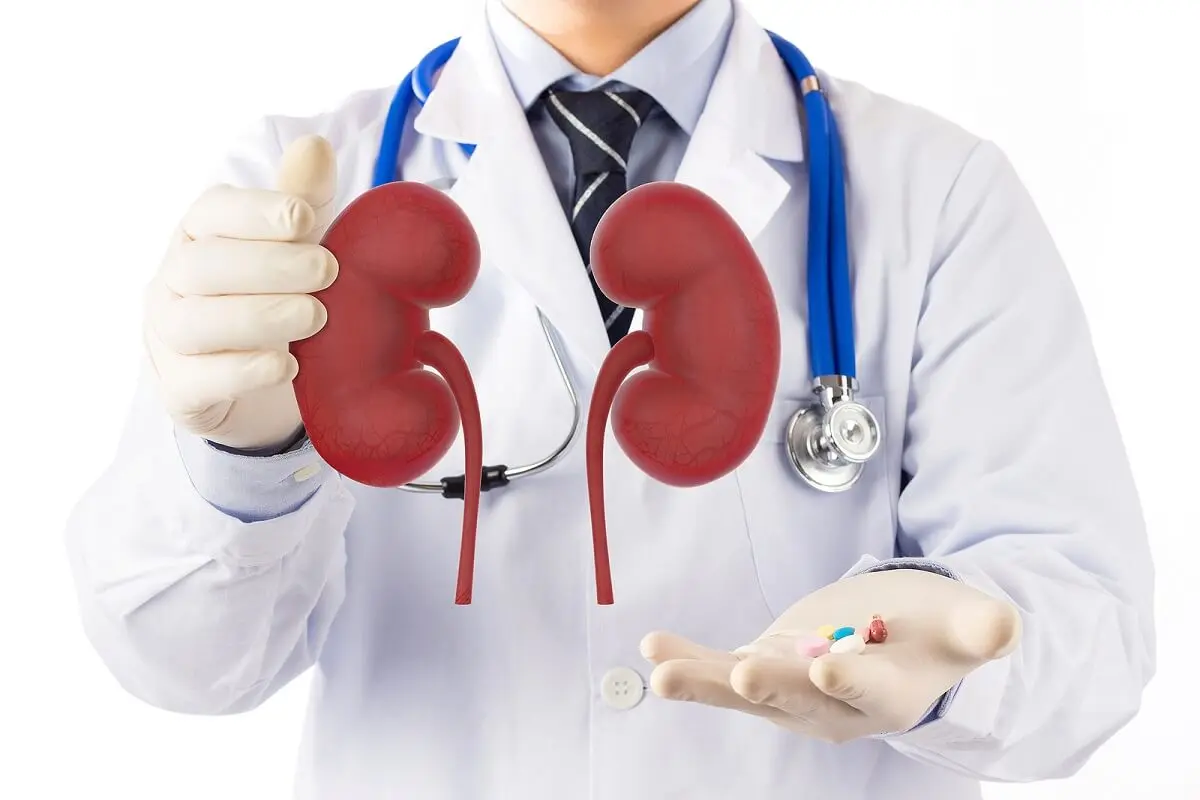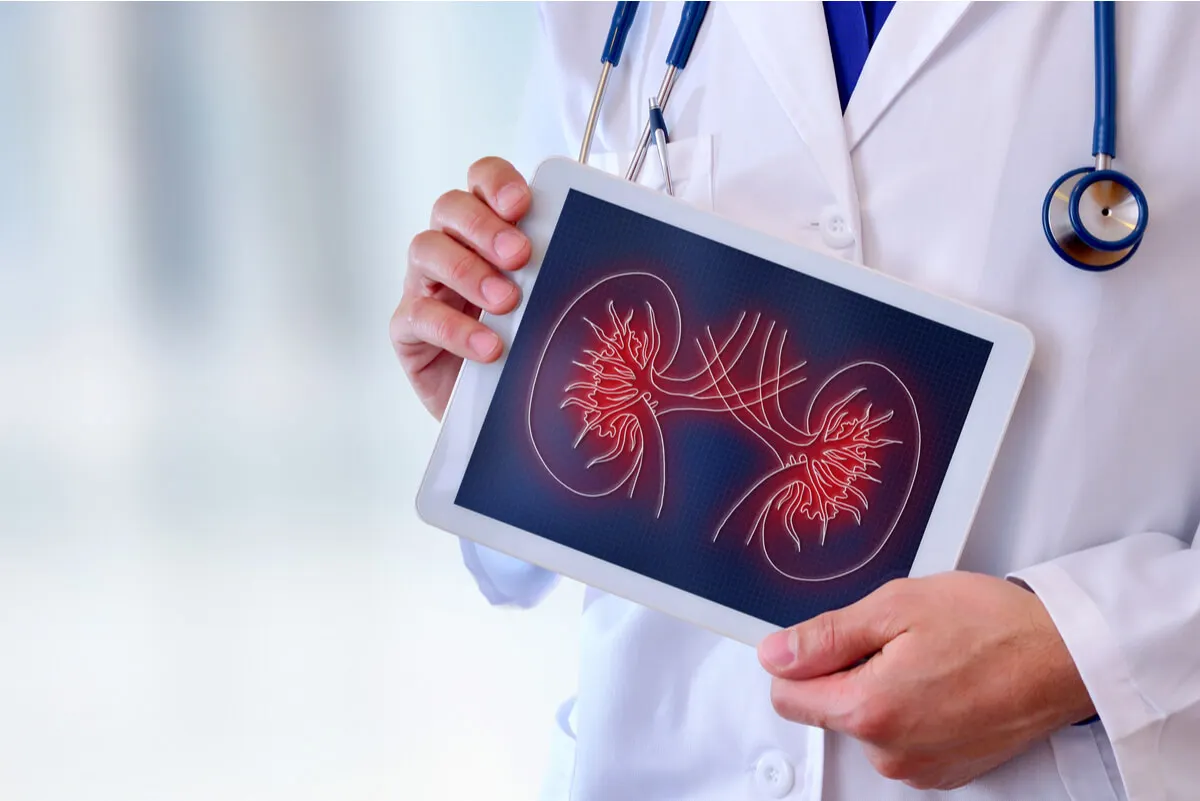When Is it Necessary to See a Nephrologist?

The nephrologist is the doctor in charge of dealing with kidney pathologies. These organs are responsible for many vital functions, such as eliminating waste and excess fluid through urine, maintaining ionic concentrations in the blood, blood pH balance, among others.
In general, a visit to this specialist is suggested when there are suspected abnormalities in kidney function or structure. Given the risks for the general well-being, a timely intervention is essential according to each case.
The kidneys and their functioning
First of all, it’s important to remember that the kidneys are two essential organs in human physiology. Both measure approximately 11 x 7 x 3 centimeters (4 x 3 x 1 inches approx.) and weigh about 150 grams (6 oz). They’re located at the back of the abdomen, on either side of the spine, in the lumbar region.
The right kidney tends to be lower than the left, due to the intra-abdominal occupation of the right side by organs such as the liver. In its internal part, through its hilum, the renal artery and vein, lymphatic drainage, nerves, and the ureter (responsible for conducting urine) all pass through it.
Among other things, these organs require a significant presence of blood vessels involved in key processes for health. Despite their size, they receive up to 20% of the cardiac output. They also have a significant distribution of nerve fibers.

Kidney functions
The main functions of the kidneys in the body include the following:
- They are a filter that removes metabolic waste, toxins, and excess fluid from the blood.
- They maintain water-electrolyte balance and acid-base balance (blood pH balance).
- Activating metabolites that regulate blood pressure.
- They have hormonal renal release functions and produce hormones such as calcitriol and erythropoietin. The latter is involved in the process of blood cell production in the bone marrow. Calcitriol is an active form of vitamin D that regulates the concentration of calcium in the blood.
It should be noted that ionic concentrations in the blood have different vital functions in human physiology. For example, sodium is involved in the regulation of blood pressure, while potassium is involved in the regulation of heart rate.
Why not take a look at this article: Discover The Right Diet for Kidney Stones
Nephrology and the nephrologist
The Latin term “logos” means “study” and the Greek term “nephros” means “kidneys”. Meanwhile, the term “renal” comes from the Latin “renes” which also means kidneys. Therefore, nephrology is the study of the kidneys.
Having said all this, the nephrologist is the specialist who works with the kidneys, both in health and disease. His or her role is to prevent, diagnose, and treat diseases that affect these organs and the urinary tract.
However, there’s another medical specialty that also deals with kidney problems; urology. Their difference lies in the fact that nephrologists are in charge of maintaining kidney health and treating the pathologies that lead to kidney malfunction (such as diabetes or arterial hypertension).
Urologists, on the other hand, deal with everything associated with the renal vasculature and urine excretion, such as anatomical anomalies of the kidneys and urinary tract, especially surgical anomalies.
So, when is it necessary to see a nephrologist?
In general, it is necessary to seek the attention of this professional when the following symptoms manifest:
- Fatigue or excessive tiredness
- Blood in the urine (hematuria)
- Changes in the density or color of the urine
- Fluid retention
- Weight loss
- Decreased appetite
- Fever
- Vomiting
- Back, side, or groin pain
- Chills
- Nausea
- Decreased urine output
- Swelling in the lower limbs
- Urinating often
- Feeling like you aren’t finished urinating
- Pain or burning when urinating
- Cloudy or foul-smelling urine
- Passing crystals in the urine
- Foam in the urine (proteinuria or loss of protein in the urine)
- Anemia (low hemoglobin) of unknown cause.
Another great article: What Do Your Kidneys Do?
Most frequent causes for referral to the nephrologist
You may be referred to the nephrologist when your doctor suspects diseases or situations that compromise the health of the kidney. The most relevant ones are listed below.
- Acute (sudden loss of kidney function) or chronic (long-term, progressive loss of kidney function) kidney failure
- Diabetic nephropathy (damage caused by diabetes)
- Upper (pyelonephritis) or lower urinary tract infection, especially if recurrent
- Hypertensive nephropathy (damage due to high blood pressure)
- Water and electrolyte imbalance
- Renal lithiasis (presence of stones)
- Renal blood vessel disorders
- Polycystic kidney disease or other genetic diseases
- Presence of autoimmune disorders
- Use of drugs or toxins
- Patient with dialysis criteria or patient on dialysis
- Presence of renal tumors
- Family history of kidney disease

Tips to take care of kidney health
Kidney health care depends largely on lifestyle. Although there are non-modifiable factors that affect the development of kidney disease, there are certain habits that can be applied to reduce the following.
- Intake of about 2 liters of water per day (the amount may vary according to individual characteristics).
- Maintaining a low sodium diet. Inadequate salt intake is both harmful to the kidney and the heart.
- Avoiding sugary drinks and processed foods, as they’re highly loaded with additives (sodium, potassium, phosphate and sugars) that result in an increased amount of toxins that overload kidney function.
- Increasing consumption of fruits and vegetables.
- Moderating carbohydrate intake.
- Consuming lean meats, especially fish, for protein. You can also substitute meat proteins with eggs and legumes.
- Preferring olive oil over soybean or sunflower oil.
- Maintaining an adequate weight.
- Increasing daily physical activity.
- Avoiding tobacco and alcoholic beverages.
- Controlling blood pressure.
- In cases of diabetes, get help to regulate your blood glucose levels.
What is the importance of the nephrologist?
The nephrologist is the specialist in charge of preserving kidney function. Therefore, it’s advisable to seek their attention at any clinical manifestation of disease in these organs.
It’s also advisable to request their intervention if there are risk factors such as diabetes, hypertension, or a family history of renal problems. This allows for early diagnosis and treatment.
Kidney disease often progresses silently until it reaches an advanced stage. If early diagnosis is achieved, the prognosis is encouraging. This can be obtained through a blood test (especially urea and creatinine) and a urine test.
All cited sources were thoroughly reviewed by our team to ensure their quality, reliability, currency, and validity. The bibliography of this article was considered reliable and of academic or scientific accuracy.
- Barret, K. Barman, S. Brooks, H. Yuan, J. Ganong Fisiología Médica. 26ª ed. Ciudad de México: McGraw Hill; 2020.
- Guyton, A. Hall, J. Tratado de fisiología médica. 11ª ed. Madrid: Elsevier; 2006.
- Hernando, L. et al. Nefrología Clínica. 3ª ed. Madrid: Editorial Médica Panamericana; 2009.
- Tortora, G. Derrickson, B. Principios de anatomía y fisiología. 11ª ed. Buenos Aires: Editorial Médica Panamericana; 2006.
-
Endre ZH. The Role of Nephrologist in the Intensive Care Unit. Blood Purif. 2017;43(1-3):78-81. doi: 10.1159/000452318. Epub 2016 Dec 3. PMID: 27915351.
This text is provided for informational purposes only and does not replace consultation with a professional. If in doubt, consult your specialist.









